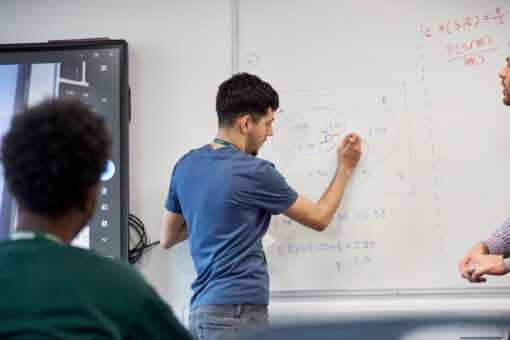
Through our industry projects with our corporate partners you will explore how coding helps you understand mathematical functions, use technology to analyse data, and tackle open-ended problems just like those in real work places. This is not just about equations; it is about developing essential skills like effective communication, collaboration and rigorous thinking – all core to our Ada values. One of our maths courses will equip you with the experience and qualifications you need, setting you up perfectly for digital careers, university, or whatever amazing path you choose!
A-level Further Mathematics
Exam board: Pearson Edexcel
Why study this course?
This is for students who love Mathematics and want a deeper understanding. It’s ideal for those considering highly mathematical university courses and careers.
What will you learn?
Compulsory Pure topics (complex numbers, matrices, proof, etc.) and optional areas such as Further Mechanics, Further Statistics, or Decision Maths, depending on your centre.
How will I be taught?
In addition to your A-level Maths lessons, you’ll have separate sessions for Further Maths. Lessons involve theory, challenging problems, and frequent practice.
How will I be assessed?
Four exam papers at the end of Year 13:
- Two compulsory Pure Maths papers
- Two optional papers Further Statistics (FS1 and FS2).
Each paper is 1 hour 30 minutes.
Where will this take me?
Further Maths is highly regarded by top universities, especially for Maths, Physics, Engineering, and Computer Science courses. It significantly strengthens university applications and mathematical readiness.
Key link
Edexcel A-Level Further Maths Specification [need link]
Something to follow
Something to read
Something to watch
A-Level Mathematics
Exam board: Pearson Edexcel
Why study this course?
Mathematics is one of the most versatile and respected A-Levels. It enhances logical thinking, problem-solving, and analytical skills, all of which are valuable for further education and a wide range of careers.
What will you learn?
You’ll study Pure Mathematics (algebra, calculus, trigonometry, etc.), Statistics (data analysis, probability) and Mechanics (forces, motion).
How will I be taught?
Through a mix of teacher-led instruction, worked examples, collaborative problem-solving, and independent practice. Visual and interactive tools (e.g. graphing software, whiteboards) will support learning.
How will I be assessed?
Three written papers at the end of Year 13:
- Paper 1 & 2: Pure Mathematics
- Paper 3: Statistics and Mechanics
Each paper is 2 hours long and equally weighted.
Where will this take me?
A-Level Mathematics is essential for apprenticeships degrees in Maths, Physics, Engineering, Economics, and Computer Science, and beneficial in Medicine, Architecture, and Finance.
Key link
Edexcel A-Level Maths Specification
Something to follow
Something to read
Something to watch
Mathematics in Context
Exam board: Pearson Edexcel
Why study this course?
Core Maths is perfect if you want to keep developing your maths skills without doing a full A-level. It’s practical and supports other subjects like Psychology, Biology, Geography, and Business.
What will you learn?
You’ll study maths used in real life: personal finance, interpreting data, estimation, critical analysis, spreadsheets, and probability in context.
How will I be taught?
You’ll explore maths through real-life problems, case studies, group work, and technology. The course focuses on applying maths to everyday and professional contexts.
How will I be assessed?
Two exam papers at the end of Year 13:
- Paper 1: Comprehension
- Paper 2: Applications
Each paper is 1 hour 40 minutes.
Where will this take me?
Highly valued by universities and employers, Core Maths strengthens applications for courses involving data analysis or quantitative reasoning. It’s particularly useful in social sciences, business, healthcare, and education.
Key link
Mathematics in Context Specification
Something to follow
- AMSP Mathematics in Context
- @MathsMrBarton [Need link] – Insightful maths content, podcasts, and teaching strategies.
- @AMSPMaths [Need link] – Advanced Maths Support Programme updates and resources.
Something to read
- “Alex’s Adventures in Numberland” by Alex Bellos – A fun and accessible dive into the world of maths.
- “The Art of Statistics” by David Spiegelhalter – Brilliant for anyone interested in real-world data analysis
Something to watch
- Numberphile (YouTube) – Fascinating maths concepts explained in a fun and visual way.
- 3Blue1Brown (YouTube) – Beautiful visuals for deep mathematical ideas.
